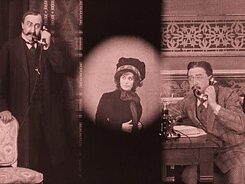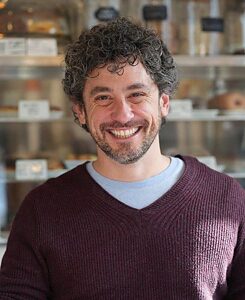Film and Discussion
Readings from Kafka's Diaries, performed by Tufts University Students
FRANZ KAFKA was born in 1883 in Prague, where he lived most of his life. During his lifetime, he published only a few short stories, including “The Metamorphosis,” “The Judgment,” and “The Stoker.” He died in 1924, before completing any of his full-length novels. At the end of his life, Kafka asked his lifelong friend and literary executor Max Brod to burn all his unpublished work. Brod overrode those wishes. 2024 marks the 100th anniversary of Kafka's death. On this occasion, we are remembering the world-famous author with a film screening and a panel.
Film Screening: 4:00 PM Kafka Goes to the Movies
 © edition filmmuseum
© edition filmmuseum
At the beginning of the 20th century, cinema was new and sensational – Franz Kafka was fascinated by it. There are numerous mentions of what Kafka had seen at the movies. Prague-born Franz Kafka (1883–1924) experienced the emergence of the cinematograph and was fascinated by the very first early films. From today’s perspective, this was “primitive cinema”, often of a tabloid nature. Nevertheless, it literally captivated Kafka, as he mentions in his diaries and his letters written to his fiancée Felice Bauer. His comments on the films are written in an “excited, passionate” and at times “melancholic tone”, according to the German actor and writer Hanns Zischler who directed the documentary
Kafka goes to the Movies.
Kafka Goes to the Movies
Director: Hanns Zischler
Germany 2002
DVD, 55 min
Panel: 5:30 PM Franz Kafka’s Diaries. Ross Benjamin and Veronika Tuckerová
Moderator: Igor Lukes, Honorary Consul General of the Czech Republic and Professor of History, Boston University
A conversation between Ross Benjamin who translated Kafka's diaries, and scholar Veronika Tuckerova. Dating from 1909 to 1923, the handwritten diaries contain various kinds of writing: accounts of daily events, reflections, observations, literary sketches, drafts of letters, accounts of dreams, as well as finished stories. This volume makes available for the first time in English a comprehensive reconstruction of the diary entries and provides substantial new content, including details, names, literary works, and passages of a sexual nature that were omitted from previous publications. By faithfully reproducing the diaries’ distinctive—and often surprisingly unpolished—writing in Kafka’s notebooks, translator Ross Benjamin brings to light not only the author’s use of the diaries for literary experimentation and private self-expression, but also their value as a work of art in themselves.
 Ross Benjamin©David Schloss
ROSS BENJAMIN’s
Ross Benjamin©David Schloss
ROSS BENJAMIN’s translations include Friedrich Hölderlin’s Hyperion, Joseph Roth’s Job, and Daniel Kehlmann’s You Should Have Left and Tyll. He was awarded the 2010 Helen and Kurt Wolff Translator’s Prize for his rendering of Michael Maar’s Speak, Nabokov, and he received a Guggenheim fellowship for his work on Franz Kafka’s diaries.
 Veronika Tuckerová ©Karel Cudlín
VERONIKA TUCKEROVA
Veronika Tuckerová ©Karel Cudlín
VERONIKA TUCKEROVA is a literary scholar and translator. She teaches at Harvard University's Slavic Department. Her interests include Czech and German literature, art and literature of dissent, and translation theory and practice. She collaborated on the exhibition From Franz Kafka to the Velvet Revolution and recently completed a book on the Czechoslovak reception of Kafka, from 1920s to 1989.
Back